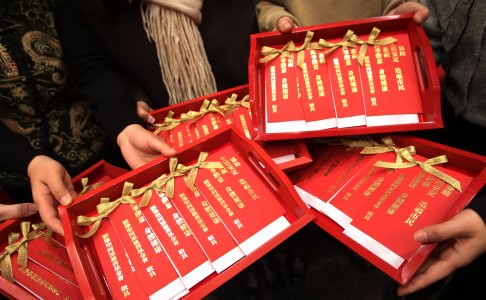
Alibaba, Tencent spark battle for virtual red envelopes during ‘China’s Super Bowl’

Hundreds of millions of Chinese, especially the younger generation, were all busy with just one thing on Lunar New Year’s eve: trying to grab as many virtual “red envelopes” online as they could, which totalled an estimated billions of yuan.
Smartphones became the battlefield and the major arenas were the online systems backed by internet giants Alibaba and Tencent. Alibaba, China’s top e-commerce firm, runs Alipay, known as the “PayPal of China”, while Tencent, the country’s top portal, operates WeChat, a real-time messaging app like the US’s WhatsApp.

It is such a mainstay over the Lunar New Year that the show has been dubbed “China’s Super Bowl”, after the most-watched event in America. Last year, the Gala attracted about 750 million viewers, about seven times that of the Super Bowl, which probably makes it the world’s biggest TV spectacle.
However this year, many people turned away from their TV sets and focused more on their smartphone screens, paying less attention to the CCTV show as they joined the battle for virtual “lai see”.
Ironically, the red-envelope game was part of the programme. Every hour, starting from 8pm until midnight, there were opportunities for TV viewers to use their smartphones to grab red envelopes once the game was announced during the live broadcast.
“There were not too many highlights on the CCTV New Year’s Gala last night,” said a commentary published on mainland news portal Sohu.com. “Instead, the biggest highlight last night may be that more people were busy with grabbing ‘red envelopes’ than those who really cared about watching television.”

Alibaba, which made the largest IPO in America last year, teamed up with Twitter-like Weibo, in which Alibaba is also a key shareholder, to encourage Weibo users to grab some pocket money online via Alipay, a tool allowing people to instantly transfer money online with just one or two clicks.
On the other side of the fence, Tencent banned Alipay from its WeChat system and encouraged smartphone users to link their WeChat accounts with their bank accounts so that they could also give each other virtual gifts via online transfer.
In the field of online payment, WeChat has been a latecomer as Alipay is already the dominant payment tool in the world’s number 1 economy.
But in the world of mobile internet, Alibaba has lagged behind local competitors like Tencent, whose WeChat real-time messaging system is used by more than 400 million people.
Joe Tsai, Alibaba’s vice-chairman, recently said in an interview with Bloomberg TV that mobile user growth would be a key target for the company in the coming years as the internet inevitably becomes more mobile-focused.
Even ahead of the Lunar New Year holiday, more than 200 million bank accounts were already linked to WeChat accounts, according to a report by the technology news channel of mainland portal NetEase.
It would be much slower and even more challenging for any traditional commercial bank to get 200 million new customers to open accounts with their bank within just few weeks.
More importantly, the internet business is all about user base and growth and that’s so far how most internet companies try to monetize.
Earlier this year, Alibaba announced it would offer “red envelopes” worth 600 million yuan (HK$756 million) in total during the Lunar New Year festivities. Tencent said it would also pour more than 500 million yuan in cash, along with 3 billion yuan worth of shopping coupons, to promote its WeChat-based red envelope service.
Meanwhile, hundreds of millions of Chinese internet users would also use money out of their own pockets to buy online red envelopes for their friends.
The latest statistics are not yet available but Tencent announced last year when it launched the online red envelopes initiative that its WeChat users spent more than 20 million yuan on virtual gifts for friends – all within the first two days of the Lunar New Year holiday.
Many WeChat users sent small amounts, ranging from 1 yuan to 10 yuan, to their friends. But some rich Chinese also liked to give hundreds or thousands of yuan to friends on WeChat to show off their personal wealth.
